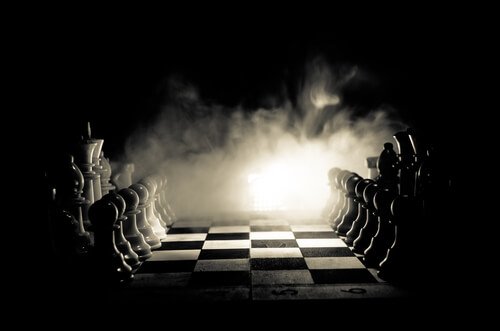Mistakes Don't Make You a Failure

A mistake doesn’t make you a failure. Let’s take chess as an example. The final result of a chess game seldom depends on luck but on the level of expertise of the two contenders. The “winner” knows they could’ve lost and that they would have had different results if they had used another strategy. The same goes for the “loser”.
Both are aware that their roles could’ve been reversed. Thus, in chess, as in many other challenges, there may be mistakes in choosing a strategy, but this isn’t the same as failing and, particularly, it doesn’t mean the players were permanently defeated. There’ll be more games. And their mistakes will allow them to improve their winning strategy.
Mistakes Don’t Make You a Failure
So, you can make a mistake because there’s always room for a new strategy. Furthermore, strategies can always be improved. Especially if you look at it from the perspective of the one who just lost. Yes, they could’ve played better. However, this loss doesn’t make them a failure. Because there’ll always be a next game and it takes a lot of moves to learn and improve.
In this regard, your time investment was profitable. In fact, a lot more so than the winner because nobody learns anything from winning. They won’t be going home thinking about the game, about what they could’ve done better to win. On the contrary, their current strategies were just reinforced. Therefore, it’ll be very hard for them to even consider changing them as they found strong reasons not to question them. So, most likely, they’ll stick with those strategies and repeat them until… someone else wins.
As you can see, victory tends to perpetuate a cycle; to reduce its investment, and this is one of the reasons why it’s so sweet. What’s there not to like about a free ride! The fact that our brain innately wants to save energy deceivingly reinforces this idea.
“The only man who never makes a mistake is the man who never does anything.”
-Theodore Roosevelt-

Failing Doesn’t Make You a Failure
Failing happens when, in addition to your momentary defeat, you get nothing out of it. This happens mainly in those games left to chance, poorly played games. Since the “loser” learns very little, they’d rather stick to their “bad luck” superstitions: “It was midnight when I lost”, “It wore my lucky t-shirt”, or “I never play with John because I never beat him”.
Leaving irony aside, luck will teach you nothing. Because in order to obtain consistently successful results, you have to work on perfecting your strategy while recognizing that it will become stagnant at some point. The circumstances of a “game” are never the same. Remain flexible about your options and modify your strategy accordingly.

Defeat Doesn’t Equal Failure
Being defeated is not collecting failure after failure, particularly if this is the first time you fail at something. Failure is a label with connotations that go way beyond its regular meaning. To say that someone is a failure or to think that you’re a failure permeates your entire self. It becomes part of the nature of your being. We’d be speaking of something immutable if that was the case.
That is something that will never change and that, therefore, becomes a life sentence. Of course, this would eliminate the motivation for learning. Why would anyone wish to try something new when you get the message that, no matter what you learn, you’ll never win? So the one who feels like a failure may still play but are unjustly deterministic and defeatist about their future. In the same way, they apply this label onto others and unfairly try to prove that it’s true.
The past can sometimes act as a predictor of the future. However, it’s the actions and not the voice that dictates it. There’s no determinism, but rather the possibility of overcoming rooted in the possibility of change. For that reason, overcoming that which scares us, in fact, attracts us. This is why such an attraction sort of dies in a person who feels like a failure and repeats it to themselves. If thoughts were water, then they would be able to get into any crack. This defeatist way of thinking sneaks far into the depths of their being.
Play the Game
Hence, defeatist thinking serves as a trigger and feeds many depressions. A depression that appears when all hope is lost. It doesn’t mean that the future will be different, but rather that you can do something about it. That you’re in control; that you can design it. Otherwise, join the club of people with mental problems, full of phobias that don’t only lead to inaction and apathy but also to depression. Keep in mind that anxiety drowns your hope to be in control of yourself, of your fate. Yes, you may be vulnerable, but never a failure.
All cited sources were thoroughly reviewed by our team to ensure their quality, reliability, currency, and validity. The bibliography of this article was considered reliable and of academic or scientific accuracy.
Abramson, L., Alloy, L., Metalsky, G., Joiner T., Sandínn B. (1997). Teoría de la depresión por desesperanza: aportaciones recientes. Revista de Psicopatología y Psicología Clínica. Vol. 2. Pag 211-222.
This text is provided for informational purposes only and does not replace consultation with a professional. If in doubt, consult your specialist.








